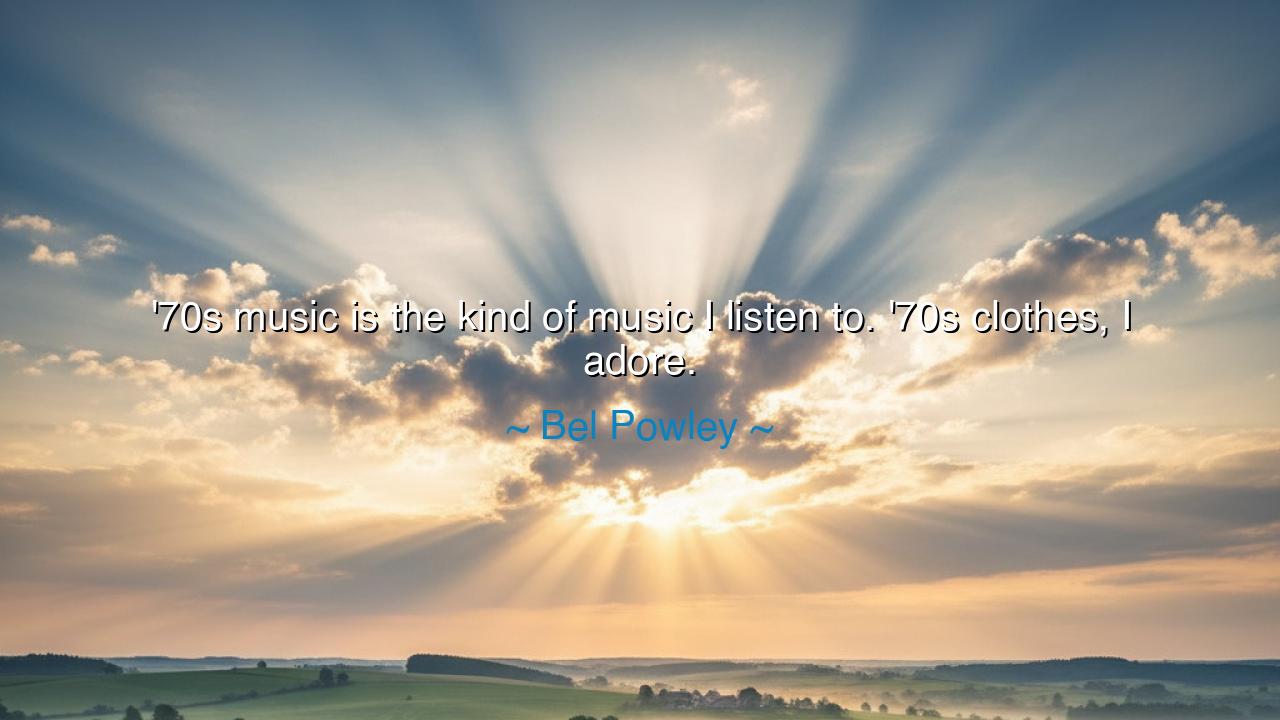
'70s music is the kind of music I listen to. '70s clothes, I






"‘70s music is the kind of music I listen to. ‘70s clothes, I adore." Thus spoke Bel Powley, and though her words seem simple, they carry a resonance that stretches across generations, like the echo of a drum in a vast valley. What she reveals is not merely a personal taste, but a profound truth: that each age leaves behind treasures of spirit and style, and those who seek wisdom do not scorn the past but embrace it. For in the rhythms of music and the threads of clothing, entire worlds are preserved—worlds of courage, rebellion, freedom, and beauty.
The 1970s were not merely years upon a calendar; they were a crucible of transformation. From the anthems of Led Zeppelin and Fleetwood Mac to the soulful cries of Marvin Gaye and the electric revolutions of David Bowie, 70s music was the voice of a restless generation. It was not sound alone, but a banner carried into the battles of identity, justice, and liberation. To listen to it now is to touch the heartbeat of that age, to let its spirit breathe again through your veins. Powley’s devotion is thus an honoring of ancestors—not of blood, but of spirit.
Likewise, the clothes of that era—flowing skirts, bell-bottoms, leather jackets, sequins shimmering like stars—were not garments alone but declarations. They said: I am free. I am unafraid. I will not be confined to the shapes and colors dictated by the past. In adorning herself with these relics, Powley is not playing dress-up; she is joining a lineage of those who dared to express with cloth what their souls demanded. Fashion, in this sense, is not vanity but courage—a statement of identity that outlives its wearer.
Let us remember the tale of Gloria Gaynor, whose anthem “I Will Survive” in 1978 became more than a song—it became a sword for the broken-hearted, the oppressed, the overlooked. It rose beyond the disco floors into the very marrow of human resilience. Even decades later, those words are sung in triumph across the world. Here we see the lesson: that the music and clothing of an age are not dead artifacts, but eternal vessels, carrying strength and spirit into future hands.
Why does Powley cherish the 70s? Because she recognizes that within its arts lies something timeless: rebellion softened into beauty, and beauty sharpened into truth. To embrace the music and clothing of another era is to remember that the struggles of the past still echo in our present. It is to say: I honor what came before, and I carry it with me. Each choice of a song, each garment pulled across the body, becomes a ritual—an act of remembrance and renewal.
The lesson for us, then, is to look backward not with scorn, but with reverence. Do not mock the styles of your fathers or the songs of your mothers, for within them lies the testimony of what it meant to be alive in their time. Seek out the art, the music, the fashion that speaks to you, even if it is centuries old, for it will feed your spirit and remind you that humanity is one long symphony, with each generation adding its own movement.
So, children of tomorrow, take this wisdom: adorn yourselves not only with the garments of your age, but also with those of ages past. Fill your ears not only with the latest sound, but with the voices of other decades, other struggles, other joys. In doing so, you weave yourself into the great tapestry of humanity. And when you walk, let the world see in your step the rhythm of music, the freedom of fashion, and the timeless courage of those who came before.
For in the end, as Bel Powley teaches, to love the 70s is not nostalgia alone—it is an act of communion. It is to reach across time, to clasp hands with the dreamers and rebels of another age, and to declare: Your fire still burns in me.






AAdministratorAdministrator
Welcome, honored guests. Please leave a comment, we will respond soon